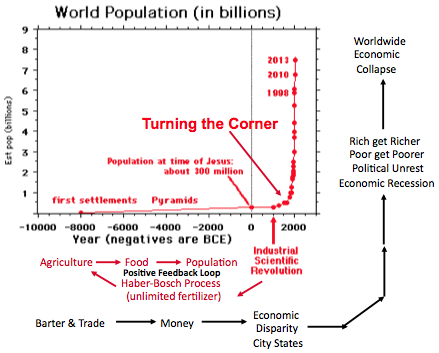
Spin Offs of Overpopulation © Eric R. Pianka Let's summarize the major consequences of overpopulation. As long as we were hunter-gatherers, human populations remained small for many millenia. Essentially, humans were limited by available food supplies. During good years, our populations increased but when conditions worsened, they decreased. Agriculture, invented about 100 centuries ago, allowed populations to increase because food leads population. As populations built up, cities were formed, and money was invented which made it possible for powerful people to exploit those less fortunate. During the first 10,000 years after the invention of agriculture, human populations climbed slowly to about 300 million at the time of Jesus (see graph). With the advent of the industrial-scientific revolution in the late 1700s and into the early 1800s, things changed rapidly -- machines were invented, agriculture benefited, food supplies increased and human populations thrived along with economic growth. 
In the early 1900s, bird and bat guano was used as fertilizer but just as supplies were beginning to run out, technology came to the rescue in the form of the Haber-Bosch process. Two German scientists, Fritz Haber and Carl Bosch, invented processes that allowed production of virtually unlimited quantities of ammonia and ammonium nitrate. Exploiting fossil fuels to create high temperature and very high pressures to break apart the stable N2 bond of atmospheric nitrogen, the resulting nitrogen atom was combined with hydrogen to form an energy-rich NH4 ammonium molecule. The Haber-Bosch process created a positive feedback loop that permitted the human population to reach current day level of seven billion. Both Haber and Bosch were awarded Nobel Prizes and their discovery has been heralded as the most important in the last century. The Haber-Bosch process rescued agriculture by using fossil fuel methane to fix atmospheric nitrogen producing virtually unlimited amounts of ammonium nitrate (Smil 2001), which is an explosive as well as a fertilizer. Without this technological "advance," neither Germany nor Japan could ever have gone to war -- moreover, humans would have been limited by food supplies at much lower population densities. Basically, humans exploited these one-time fossil energy reserves to demolish many of Earth's natural ecosystems and turn them into arable land and crops to feed increasing numbers of people. Runaway population growth has led to massive consumption of energy, which in turn has generated waste heat and produced the greenhouse gases carbon dioxide and methane. These have caused global warming, released more methane, and have acidified and warmed the world's oceans. When coupled with overfishing, marine ecosystems are collapsing. Also ice is rapidly melting and sea levels are rising leading to the inundation of low lying areas. 
Last updated 23 October 2014 by Eric R. Pianka |